Toyota Camry is equipped with Tire Pressure Monitoring System (TPMS) for the purpose of warning the driver when one or more of the tires are significantly under-inflated, creating a potentially unsafe driving condition. In this article we discuss the reasons for the amber colored TPMS warning light in Camry, and how you can reset it.

The TPMS warning light illuminates in Toyota Camry when air pressure is low in one or more of the tires, battery has depleted in a pressure sensor, TPMS receiver module has malfunctioned, or a pressure sensor has been damaged.
Low tire pressure
When the amber colored TPMS warning light  turns on in your Camry, stop your vehicle when it is safe to do so and check tire pressure on all the wheels, including the spare wheel (if your vehicle has one). Driving on a significantly under-inflated tire causes the tire to overheat and can lead to tire failure.
turns on in your Camry, stop your vehicle when it is safe to do so and check tire pressure on all the wheels, including the spare wheel (if your vehicle has one). Driving on a significantly under-inflated tire causes the tire to overheat and can lead to tire failure.

Reinflate the tires
Reinflate all the tires of your Camry to the manufacturer specified air pressure, which is mentioned on the vehicle placard or tire inflation pressure label usually located on the B-pillar or the edge of the driver door. If you can’t find the label, check the size of your tire which is mentioned on the sidewall of the tire, and match it to the tire pressure information shown below. These are official cold tire pressure values for Camry from Toyota.
Two-wheel drive (2WD) models
- 205/65R16 95H: 35 psi (240 kPa, 2.4 bar)
- 215/55R17 94V: 35 psi (240 kPa, 2.4 bar)
- 235/45R18 94V: 35 psi (240 kPa, 2.4 bar)
- 235/40R19 92V: 35 psi (240 kPa, 2.4 bar)
- 235/40R19 96Y: 33 psi (230 kPa, 2.3 bar)
- T155/70D17 110M (Spare): 60 psi (420 kPa, 4.2 bar)
All-wheel drive (AWD) models
- 215/55R17 94V: 36 psi (250 kPa, 2.5 bar)
- 235/45R18 94V: 36 psi (250 kPa, 2.5 bar)
- 235/40R19 92V: 36 psi (250 kPa, 2.5 bar)
- T155/70D17 110M (Spare): 60 psi (420 kPa, 4.2 bar)

Resetting the TPMS warning light
After you have inflated all the tires to the correct air pressure, the TPMS warning light should turn off automatically after driving for a few miles. Toyota Camry uses the direct method for monitoring tire pressure, which means a pressure sensor actively records the internal pressure of the tire on each wheel. If the warning light doesn’t turn off you should perform a reset procedure.
The tire pressure warning system must be initialized in the following circumstances:
- When the tire inflation pressure is changed such as when changing traveling speed or load weight.
- When the tire inflation pressure is changed such as when the tire size is changed.
- When rotating the tires.
- Vehicles with a tire inflation pressure display function: After performing the transmitter ID code registration procedure.
When the tire pressure warning system is initialized, the current tire inflation pressure is set as the benchmark pressure.
TPMS reset procedure in Toyota Camry
- Park the vehicle in a safe place and stop the engine for 20 minutes or more. The initialization procedure cannot be started while the vehicle is moving.
- Adjust the tire inflation pressure to the specified cold tire inflation pressure level.
Note: Make sure to adjust the tire pressure to the specified cold tire inflation pressure level. The tire pressure warning system will operate based on this pressure level. - Start the engine.
- Select the settings tab on the multi-information display (instrument cluster) using the meter control switches on the steering wheel.
- 4.2-inch display: Select Vehicle Settings and then press OK.
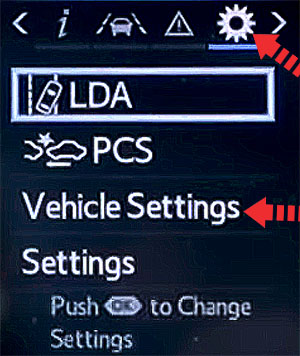
7-inch display: Select and then press and hold OK.
and then press and hold OK.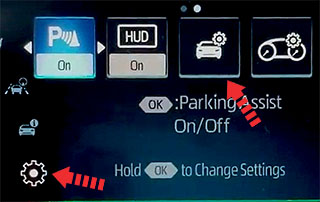
- Select TPWS.
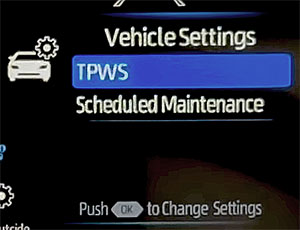
- Select Set Pressure then press and hold the OK button until the tire pressure warning light blinks 3 times. Then a message will be displayed on the multi-information display.
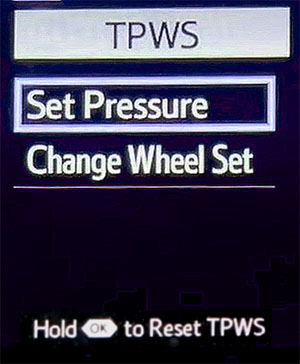
- Vehicles with a tire inflation pressure display function: “- – -” will be displayed on the multi-information display for the inflation pressure of each tire while initialization is being performed.
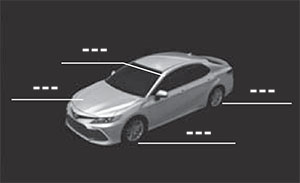
- Drive at approximately 25 mph (40 km/h) or more for approximately 10 to 30 minutes.
When initialization is complete, the inflation pressure of each tire will be displayed on the multi-information display.
Even if the vehicle is not driven at approximately 25 mph (40 km/h) or more, initialization can be completed by driving for a long time. However, if initialization does not complete after driving for 1 hour or more, park the vehicle in a safe place for approximately 20 minutes and then drive the vehicle again.
If the low tire pressure light does not turn off automatically after reinflating the tires in your Camry, increase the tire pressure by 5 psi on top of the factory recommended value, and drive your vehicle for at least 10 miles (16 km). After the TPMS warning light turns off, and the vehicle has been parked for a few hours, reduce the tire pressure to the factory recommended value.
Chilly weather can turn on low tire pressure light in Camry
Cold weather is one of the most common cause for low tire pressure warning light in Toyota Camry. When analyzing WheelsJoint’s statistical data, it has been observed that there is sharp rise in the number of searches for TPMS warning light causes at the start of every winter season, about three times higher as compared to mid summer season.

The air, like most other substances, expands when heated and contracts when cooled. So when the weather gets colder, the tire pressure decreases, which could trigger TPMS warning light in Camry. The tire pressure will vary with temperature by about 1 psi (7 kPa) for every 12°F (6.5°C).

Inflate tires when cold
Tire pressure in Camry should always be set based on cold inflation tire pressure. This is defined as the tire pressure after the vehicle has not been driven for at least three hours, or driven less than 1 mile (1.6 km) after a three-hour period.
Do not adjust tire pressure when hot
The tires on your Camry can get around 50 degrees hotter than the outside temperature when you’re driving, which increases the tire pressure by about 4 psi – this is normal and there should be no adjustment for this increased pressure.
Does altitude affect tire pressure?
Yes, altitude can change tire pressure values, but it is negligible and not a cause for concern. If you drive your Camry from sea level to Mount Evans Scenic Byway in Colorado which is the highest paved road in North America at the altitude of 14,130 feet (4,307 m), the tire pressure should theoretically increase by approximately 6 psi. But, the decrease in ambient temperature at higher elevation contracts the air in tires and compensates for any altitude pressure changes.
Is it safe to drive Camry with low tire pressure?
The driving characteristics of Camry change even if the air pressure is 5 psi less than manufacturer’s recommended value: the braking distance can be longer, cornering worse, and at particularly high speeds there is even a risk that the tire will burst. Low tire pressure also increases tire wear, and the higher rolling resistance of the tire means higher fuel consumption. So it is recommended to reinflate the tires to the correct pressure as soon as possible.
Dead battery in a tire pressure sensor
Each tire pressure sensor in Camry is powered by a built-in lithium-ion battery. When the battery is depleted, the sensor stops transmitting tire pressure information to the receiver module. When this happens, the TPMS warning light will flash every time the engine is started, and will remain illuminated until you turn off the vehicle.

How long do the pressure sensor batteries last?
The tire pressure sensor batteries usually last anywhere from 5 to 10 years in Camry. When the battery is depleted, you must replace the sensor itself, as the battery is sealed into the sensor unit and is non-replaceable.
Identifying a faulty pressure sensor
The most reliable method for detecting a faulty tire pressure sensor or a sensor with dead battery is by testing each sensor with a scan tool. For example, MaxiTPMS TS408 is commonly used for diagnosing and programming tire pressure sensors. A sensor that is not detectable by the scanner is most likely defective and should be replaced with a new one.

If you don’t want to spend over a hundred bucks on a scanner, then head over to any reputable tire shop and perform a TPMS diagnostic scan of your Camry. Some shops like Discount Tire and Pep Boys offer free of charge TPMS diagnostic services.
Installed new tires?
If a pressure sensor stopped responding after you installed new tires on your Camry, it is possible the sensor got damaged during tire installation. These sensors are quite sensitive, and can be easily damaged if utmost care is not taken while changing tires.
Toyota Camry TPMS user guide
Your vehicle is equipped with a tire pressure warning system that uses tire pressure warning valve and transmitters to detect low tire inflation pressure before serious problems arise.
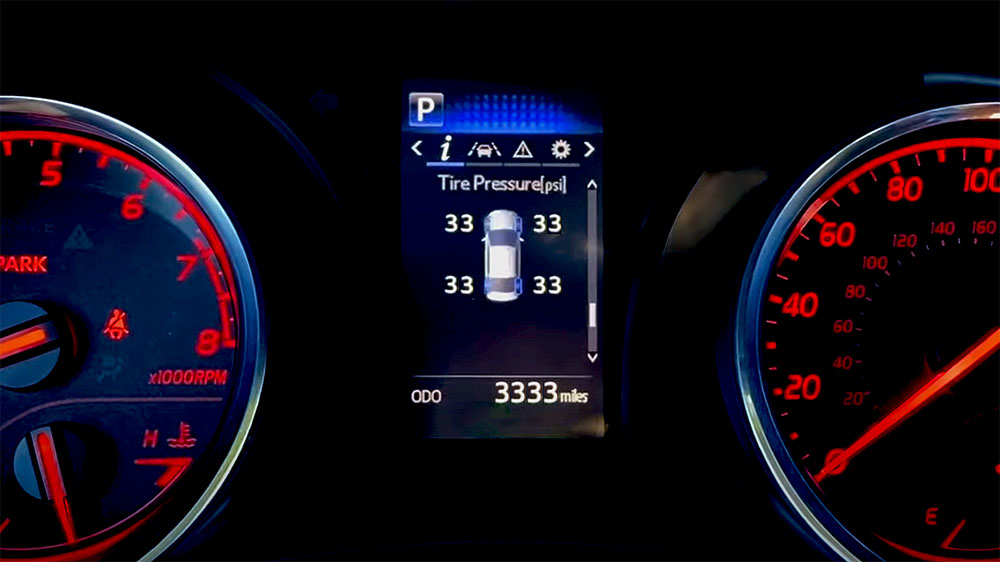
Vehicles without a tire inflation pressure display function: If the tire pressure drops below a predetermined level, the driver is warned by a warning light.
Vehicles with a tire inflation pressure display function: The tire pressure detected by the tire pressure warning system can be displayed on the multi-information display.
If the tire pressure drops below a predetermined level, the driver is warned by a screen display and a warning light.
Installing tire pressure warning valve and transmitters
When replacing the tires or wheels, the tire pressure warning valve and transmitters must be installed to the wheels which will be installed to the vehicle. When new tire pressure warning valve and transmitters are installed, new ID codes must be registered in the tire pressure warning computer and the tire pressure warning system must be initialized.
Registering ID codes
Vehicles without a tire inflation pressure display function: Every tire pressure warning valve and transmitter has a unique ID code. In addition to the set of tire pressure warning system sensor ID codes initially registered to the vehicle, a second set of ID codes can be registered. A second set of tire pressure warning system sensor ID codes can be registered at your Toyota dealer. When 2 sets of ID codes have been registered, either ID code set can be selected.
Vehicles with a tire inflation pressure display function: Every tire pressure warning valve and transmitter has a unique ID code. When replacing a tire pressure warning valve and transmitter, it is necessary to register the ID codes.
Changing the available set of ID codes (vehicles without a tire inflation pressure display function)
When 2 sets of ID codes are registered, the corresponding ID code set for the installed wheels can be selected in the settings of the multi-information display. It is not necessary to reregister the ID codes each time the wheels are changed. For information regarding changing the registered ID codes for an ID code set, contact your Toyota dealer.
How to register the ID codes (vehicles with a tire inflation pressure display function)
- Park the vehicle in a safe place, wait for approximately 20 minutes, and then start the engine.
- Select settings tab on the multi-information display using the meter control switches on the steering wheel.
- 4.2-inch display: Select “Vehicle Settings”.
7-inch display: Select and then press and hold OK.
and then press and hold OK. - Select TPWS.
- Select Change Wheel and then press and hold the OK button until the tire pressure warning light blinks slowly 3 times. Then a message will be displayed on the multi-information display.
- When registration is being performed, the tire pressure warning light will blink for approximately 1 minute then illuminate and “- -” will be displayed for the inflation pressure of each tire on the multiinformation display.
- Drive at approximately 25 mph (40 km/h) or more for approximately 10 to 30 minutes.
Note: Registration is complete when the tire pressure warning light turns off and the inflation pressure of each tire is displayed on the multi-information display.
Note: Even if the vehicle is not driven at approximately 25 mph (40 km/h) or more, registration can be completed by driving for a long time. However, if registration does not complete after driving for 1 hour or more, perform the procedure again from the beginning. - Reset the tire pressure warning system.
Situations in which the tire pressure warning system may not operate properly
In the following situations, the tire pressure warning system may not operate properly.
- If non-genuine Toyota wheels are used.
- If a tire has been replaced with a tire that is not an OE (Original Equipment) tire.
- If a tire has been replaced with a tire that is not of the specified size.
- If tire chains, etc. are installed.
- If a window tint that affects radio wave signals is installed.
- If there is a lot of snow or ice on the vehicle, particularly around the wheels or wheel housings.
- If the tire inflation pressure is much higher than the specified level.
- If wheels not equipped with tire pressure warning valve and transmitter are used.
- If the ID codes of the tire pressure warning valve and transmitters are not registered in the tire pressure warning computer.
Performance may be affected in the following situations.
- When driving near a TV tower, electric power plant, gas station, radio station, large display, airport or other facility that generates strong radio waves or electrical noise.
- When carrying a portable radio, cellular phone, cordless phone or other wireless communication device
Vehicles with a tire inflation pressure display function: If tire position information is not correctly displayed due to the radio wave conditions, the display may be corrected by changing the location of the vehicle as the radio wave conditions may change.
When the vehicle is stopped, the time taken for the warning to start or turn off may be longer.
When the inflation pressure of a tire drops rapidly, for example when a tire has burst, the warning may not operate.
Initialization procedure guidelines (TPMS reset)
- Make sure to perform the initialization procedure after adjusting the tire inflation pressure. Also, make sure the tires are cold before performing the initialization procedure or adjusting the tire inflation pressure.
- If the engine switch is turned to the “LOCK” position (vehicles without a smart key system) or off (vehicles with a smart key system) during initialization, it is not necessary to restart the initialization procedure from the beginning as it will begin automatically when the engine switch is turned back to the “ON” position (vehicles without a smart key system) or IGNITION ON mode (vehicles with a smart key system).
- If initialization has accidentally been started when it is not necessary, adjust the tire inflation pressure to the specified level when the tires are cold and then perform the initialization procedure again.
- Vehicles with a tire inflation pressure display function: While the position of each tire is being determined and the inflation pressures are not being displayed on the multi-information display, if the inflation pressure of a tire drops, the tire pressure warning light will come on.
Warning performance of the tire pressure warning system
The warning of the tire pressure warning system will change in accordance with the conditions under which it was initialized. For this reason, the system may give a warning even if the tire pressure does not reach a low enough level, or if the pressure is higher than the pressure that was adjusted to when the system was initialized.
If the tire pressure warning system is not initialized properly
Vehicles without a tire inflation pressure display function:
Initialization can be completed in a few minutes. However, in the following cases, the settings have not been recorded and the system will not operate properly. If repeated attempts to record tire inflation pressure settings are unsuccessful, have the vehicle inspected by your Toyota dealer.
If initialization is attempted and the tire pressure warning light does not blink 3 times.
If, when the vehicle has been driven for about 20 minutes after performing initialization, the tire pressure warning light blinks for approximately 1 minute and then illuminates.
Vehicles with a tire inflation pressure display function:
In the following situations, initialization may take longer than usual to be completed or may not be possible. (Usually, the vehicle will need to be driven for approximately 10 to 30 minutes to complete initialization.) If initialization is not complete after driving approximately 30 minutes, continue driving for a while.
- If the vehicle is driven on an unpaved road, it may take longer to complete initialization.
- If the vehicle is backed up while performing initialization, data collected during initialization will be cleared and it will take longer than normal to complete.
- If the vehicle is driven in heavy traffic or another situation where other vehicles are driven close by, it may take time for the system to recognize the tire pressure warning valve and transmitters of your vehicle over those of other vehicles.
If initialization is not complete after driving for approximately 1 hour, park the vehicle in a safe place for approximately 20 minutes and then drive the vehicle again.
In the following situations, initialization will not be started or was not completed properly and the system will not operate properly. Perform the initialization procedure again.
- If, when attempting to start initialization, the tire pressure warning light does not blink 3 times.
- If, when the vehicle has been driven for about 20 minutes after performing initialization, the tire pressure warning light blinks for approximately 1 minute and then illuminates.
If initialization cannot be completed after performing the above procedure, contact your Toyota dealer.
When registering ID codes (vehicles with a tire inflation pressure display function)
- Before performing ID code registration, make sure that no wheels with tire pressure warning valve and transmitters installed are near the vehicle.
- Make sure to initialize the tire pressure warning system after registering the ID codes. If the system is initialized before registering the ID codes, the initialized values will be invalid.
- As the tires will be warm when registration is completed, make sure to allow the tires to cool before performing initialization.
Canceling ID code registration (vehicles with a tire inflation pressure display function)
- To cancel ID code registration after it has been started, turn the engine switch off before driving the vehicle. If the vehicle is driven after ID code registration is started, to cancel registration, perform the ID code registration start procedure again and turn the engine switch off before driving.
- If ID code registration has been canceled, the tire pressure warning light will blink for approximately 1 minute when the engine switch is turned to the “ON” position (vehicles without a smart key system) or IGNITION ON mode (vehicles with a smart key system) and then illuminate. The tire pressure warning system will be operational when the tire pressure warning light turns off.
- If the warning light does not turn off even after several minutes have elapsed, ID code registration may not have been cancelled correctly. To cancel registration, perform the ID code registration start procedure again and then turn the engine switch off before driving.
If ID codes are not registered properly (vehicles with a tire inflation pressure display function)
In the following situations, ID code registration may take longer than usual to be completed or may not be possible. (Usually, the vehicle will need to be driven for approximately 10 to 30 minutes to complete ID code registration.) If ID code registration is not complete after driving for approximately 30 minutes, continue driving for a while.
- If the vehicle is driven on an unpaved road, it may take longer than normal to complete registration.
- If the vehicle is backed up while performing registration, data collected during registration will be cleared, and it will take longer than normal to complete.
- If the vehicle is driven in heavy traffic or another situation where other vehicles are driven close by, it may take time for the system to recognize the tire pressure warning valve and transmitters of your vehicle over those of other vehicles.
- If a wheel with a tire pressure warning valve and transmitter installed is inside or near the vehicle, registration of the ID codes for the installed wheels may not be possible.
If ID registration is not complete after driving for approximately 1 hour, park the vehicle in a safe place for approximately 20 minutes and then perform the ID code registration procedure again.
In the following situations, ID code registration will not be started or was not completed properly and the system will not operate properly. Perform the ID code registration procedure again.
- If, when attempting to start ID code registration, the tire pressure warning light does not blink slowly 3 times.
- If, when the vehicle has been driven for about 20 minutes after performing ID code registration, the tire pressure warning light blinks for approximately 1 minute and then illuminates.
If ID code registration cannot be completed after performing the above procedure, contact your Toyota dealer.
When inspecting or replacing tires
Observe the following precautions to prevent accidents. Failure to do so may cause damage to parts of the drive train as well as dangerous handling characteristics, which may lead to an accident resulting in death or serious injury.
- Do not mix tires of different makes, models or tread patterns. Also, do not mix tires of remarkably different treadwear.
- Do not use tire sizes other than those recommended by Toyota.
- Do not mix differently constructed tires (radial, bias-belted or bias-ply tires).
- Do not mix summer, all season and snow tires.
- Do not use tires that have been used on another vehicle. Do not use tires if you do not know how they were used previously
When initializing the tire pressure warning system
Do not initialize the tire pressure warning system without first adjusting the tire inflation pressure to the specified level. Otherwise, the tire pressure warning light may not come on even if the tire inflation pressure is low, or it may come on when the tire inflation pressure is actually normal.
Repairing or replacing tires, wheels, tire pressure warning valve and transmitters and tire valve caps
- When removing or fitting the wheels, tires or the tire pressure warning valve and transmitters, contact your Toyota dealer as the tire pressure warning valve and transmitters may be damaged if not handled correctly.
- Make sure to install the tire valve caps. If the tire valve caps are not installed, water may enter the valves of the tire pressure warning valve and transmitters and the valves may become stuck.
- When replacing tire valve caps, do not replace them with metal caps or any tire valve caps other than specified, as they may become stuck.
To avoid damage to the tire pressure warning valve and transmitters
When a tire is repaired with liquid sealants, the tire pressure warning valve and transmitter may not operate properly. If a liquid sealant is used, contact your Toyota dealer or other qualified service shop as soon as possible. Make sure to replace the tire pressure warning valve and transmitter when replacing the tire.
Repairing or replacing snow tires
Request repairs or replacement of snow tires from Toyota dealers or legitimate tire retailers. This is because the removal and attachment of snow tires affects the operation of the tire pressure warning valve and transmitters.
Fitting tire chains (vehicles with 16 and 17-inch tires)
The tire pressure warning valve and transmitters may not function correctly when tire chains are fitted.
Reset the entire system
If the low tire pressure warning light won’t turn off due to a glitch in the tire pressure monitoring system, it may be possible to reset the TPMS system by resetting all on-board computers in your Camry. This method should only be considered as a last resort, when all else fails.

You can reboot all the on-board computers by disconnecting the main 12 volt battery for a few minutes. Remove the cable from the negative terminal of the battery first, then from the positive terminal. With the battery disconnected, press the horn button a few times and turn on the headlights to drain out all the residual electricity from the system. After about 15 minutes, reconnect the battery in reverse order: positive cable first, then negative cable.
Tire pressure keeps getting low
If the TPMS warning light turns on frequently in your Camry, and the tire pressure is also decreasing after you have reinflated the tires, there may be an air leak. One or more of the tires may have been punctured by an external object, or the air may be leaking from a defective value stem.

Can I disable the TPMS system in Camry?
No, the TPMS system is federally mandated, and cannot be disabled in Toyota Camry. All vehicles must have a working tire pressure monitoring system to be legally compliant.
Use OBD2 scanner for diagnosis
Since Toyota Camry is equipped with on-board diagnostics (OBD), a fault diagnosis can provide initial indications of where the malfunction is located. But when it comes to TPMS, a basic code reader will not suffice. You will need an advanced scanner to monitor TPMS data or read TPMS codes.

BlueDriver is a commonly used scanner by DIYers that can read TPMS codes for most vehicles and isn’t too expensive – costs about a hundred bucks. You can also clear the TPMS fault codes with this device which will turn off the warning light, but the light may come back on if the on-board diagnostic system detects a fault again.



